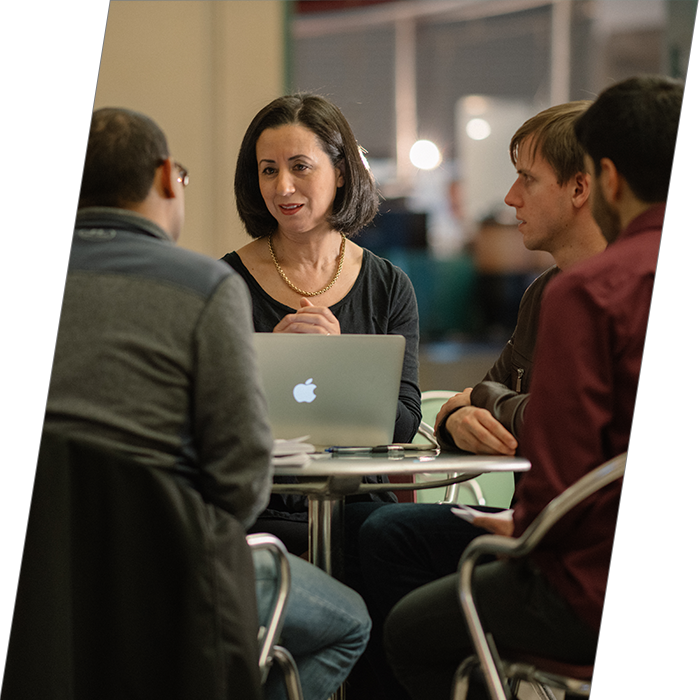Join MIT Sandbox as a Mentor
Launched in 2016, the MIT Sandbox Innovation Fund Program has become the foundation of the entrepreneurial ecosystem at MIT. The goal of the program is to enable any MIT student — inspired to solve a problem with an innovative solution — to learn and experience entrepreneurship.
MIT Sandbox is not a competition. Each semester, the program engages 300-400 diverse, student-led teams and provides guidance from experienced mentors, insights from startup-related experts, and up to $25K in non-dilutive, cumulative funding. Many teams spend 12-18 months in the Sandbox exploring, growing, and taking risks. Some will launch very successful startups and others will gain insight into entrepreneurship and leadership that they will use throughout their careers. It is a learning experience for all and a life-altering experience for many. View the latest news about current and alumni teams.
Mentorship is Central to MIT Sandbox
More than any other aspect of their Sandbox experience, teams recognize their mentors as key to their learning and growth as a startup.
Mentors are advisors who help teams:
set direction and goals
ask the right questions
develop an effective pitch
build confidence and celebrate failure as key to learning
Mentors are connectors to:
core business and entrepreneurship concepts
I&E resources and individuals who could help teams advance
Mentors are facilitators who:
lead group mentor sessions
encourage teams to engage with each other
Expectations
Commit to 1 year of mentoring and approximately 6-8 hours per month mentoring 4 to 5 teams in different phases of development.
Meet with assigned teams once a month and four times per semester.
Teams are communicating with mentors throughout the semester via email and may set up virtual or face-to-face meetings.
If you are leading group mentoring, you meet with all the teams in your group at the same time once a month.
Provide oversight and accountability of the team project and budget plans.
At the end of semester, provide feedback on the progress of your teams.
During each application cycle:
Participate in the review of new team proposals and make funding level recommendations to the Executive Director.
Participate in Mock Funding Board pitch reviews.
Qualifications
MIT Sandbox seeks to engage the expertise of local industrial and high-tech communities, global experts, and the MIT alumni community. We welcome both seasoned professionals and young entrepreneurs to our mentoring program.
An ideal Sandbox mentor:
Is an excellent facilitator
Enjoys coaching and teaching
Has first-hand startup experience or executive-level leadership experience
Has expertise in at least one startup-related topic
Has strong industry experience in at least one vertical
Lives or works in the Boston metro area
Enjoys working with students embarking on their first entrepreneur experience
Embraces the educational mission of MIT Sandbox
Why Become a Sandbox Mentor
You have the opportunity to stay current with many ideas and technologies at MIT.
You will be part of a network of experienced mentors with extensive and diverse knowledge in entrepreneurship where best practices are shared.
You will be invited to mentor training, Sandbox workshops, showcases and events.
You gain the satisfaction of working with innovative student-led teams and helping them accelerate their learning and their ideas.
“The mentorship and guidance in MIT Sandbox has been critical. Having mentors listen and comment on your daily struggles brings clarity to a difficult and ambiguous job.”
Conflict of Interest Policy
Many mentors are also investors and, as a result, may wish to invest in one of the Sandbox teams. For this reason, Sandbox has put in place a policy for mentors and students regarding conflict of interest that may arise due to the interaction of Contributors (or representatives, investors, members, or affiliates of Contributors) with MIT and MIT students through the Program.
The policy provides, among other things, the process below in case a Contributor Party wishes to engage in discussions with a student about the possibility of investing in his or her entrepreneurial idea prior to that student graduating from MIT.
The Contributor must disclose to MIT the interest in engaging in investment discussions with the student or team.
If the student does not already have an independent venture mentor through the Program, MIT will appoint one for the student.
If the student and the Contributor Party close on an investment, MIT will decide, based on a review of the facts and circumstances, whether or not the Contributor may remain active in the Sandbox.
If MIT decides that the Contributor may remain active in the Program, the Contributor must thereafter recuse itself from any Program discussion or decision, including any Funding Board discussion, pertaining to that student enterprise.
MIT will determine who is included as a Contributor Party with a Contributor.
““The mentorship really helped us grow and mature from students to serious entrepreneurs. The foundation of our mentors’ advice will be extremely advantageous as we move forward.”
”


